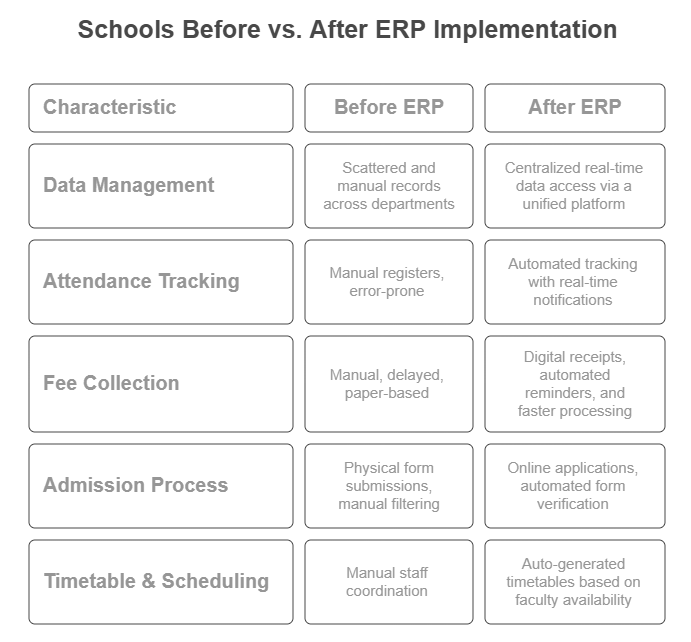A school ecosystem is made up of students, teachers, parents, and administrators. And with the interaction among these stakeholders within the system, a significant amount of data is exchanged. To offer high-quality education and personalized journeys to students, schools need a way to make sense of the data. That’s where School ERP Software comes in. Designed specifically for educational institutions, school ERP systems unify all administrative tasks (repetitive and otherwise) into one unified platform.
Whether it is a college or a school, an ERP system for schools comes with a set of benefits. From smarter data management and optimizing staff to gaining real-time insights and ensuring compliance, it does it all.
Now, let’s explore how school management software (including higher education ERP systems) reduces manual tasks and enhances overall operational efficiency.
Key Ways School ERP Software Enhances Administrative Efficiency

Centralized Data Management
Among the major challenges that schools face is managing data that is scattered across departments. The data for admissions, academics, finance, and HR is stored separately, hurting the accuracy of available data.
However, ERP software for schools acts as a unified platform where all the scattered data is stored, organized, and updated in real-time. This data may include the following and even beyond:
- Attendance Records
- Academic History
- Fee Status
- Student Exam Performance
- Payroll Data
Within a school management software, all the data is available at a single click. Such a system not only ensures accuracy in school administration but also enables swift and data-driven decision-making.
Automated Routine Tasks
Whether managing attendance, processing applications, scheduling classes, or sending reminders, schools spend a significant amount of time on these repetitive tasks.
A comprehensive school management allows schools to automate most of these activities. This is due to features such as:
- Automated report card and ID card generation
- Tracking attendance and sending out notifications as necessary
- Digital receipts and alerts for automated fee collection
- Scheduling of timetables based on faculty availability
- Online verification and admission form submission
When these repetitive (yet time-consuming) tasks are automated, school administrators can use the saved time and energy for more productive and innovative initiatives.
Efficient Resource Management
Managing faculty payroll, leaves data, scheduling and availability, and resource allocation is also a major administrative task in schools.
In this regard, a robust school ERP system helps by:
- Attendance data integration for swift and accurate salary calculation.
- Smart, timetable-based classroom and lab equipment allocation.
- Unified platform for tracking faculty performance and workload.
- Workflows to enable leave requests and approvals.
With some advanced features like faculty growth tracking and workload balancing, higher education ERP systems also work well for schools and colleges with a hefty staff.
Real-time Reporting
Incomplete or delayed data often hampers quick decision-making in schools. That’s because manual record-keeping (which has been the traditional way) does not offer real-time updation and insights.
ERP software provides a real-time dashboard that also offers customizable reports, covering metrics such as:
- Status of Fee Collection
- Enrollment Trends
- Summarized Attendance Data
- Analysis of Academic Performance
- Transport and Hostel Utilization Reports
Armed with this information, schools can not only make data-backed decisions but also identify issues quickly, making way for better accountability across various departments.
Enhanced Data Security
Manually storing data increases the risk of unauthorized access to data, which can lead to loss or misuse of the data. That’s where the modern school ERP software comes in handy as it offers robust data encryption, secure backup, and role-based access controls.
This means that only authorized personnel can access valuable data, and every activity inside the system is logged and monitored. When all of this is combined, it not only builds trust among all stakeholders but also protects institutions against data loss and notorious cybercriminals.
Improved Compliance
Today, schools have to ensure compliance with several government regulations. These include everything from the requirements of educational boards to financial audits. Tracking these compliances manually consumes a lot of time and might also lead to missed deadlines and penalties.
In this regard, ERP software helps in the following:
- Maintains accurate digital records
- Generates timely reports in formats that are approved.
- Ensures seamless RTE compliance, board exam submissions, and accreditation audits.
Cost and Time Efficiency
A comprehensive school management software automates repetitive tasks, reduces paperwork, and streamlines workflows, thereby cutting down on administrative overhead.
Overall, the benefits of such ERP systems include:
- Lower printing costs and paper usage.
- Lower staffing requirements for clerical positions.
- Swift processing of admissions, fee collection, and examination results.
- Quick response to parent and student inquiries.
Smooth operations and cost savings, which are inherent in school ERP software, make it an amazing solution for schools.
Enhanced Stakeholder Management
For a school to thrive, seamless engagement between students, parents, and teachers is essential.
In this regard, school ERP software offers dedicated portals and applications, which:
- Stores and sends fee alerts, progress reports, and transport tracking data to parents.
- Allows students to access online examinations, timetables, and homework.
- Teachers can use it to manage attendance, submit students’ marks, and access teaching schedules.
- Works as a unified platform for the administrative department of schools to monitor all communications and activities.
Scalability & Integration
Another great thing about a robust school ERP software is that it integrates seamlessly with:
- Learning Management Systems (LMS)
- Online Examination Platforms
- Digital payment gateways
- Biometric attendance systems
- Government education portals
As the school’s tech stack and administrative requirements evolve, a robust school ERP software evolves with them.
Choosing the Right ERP Software for Your School
As you saw, the capabilities of ERP software for schools today are limitless. However, schools need to pick the right ERP software to make the most of their potential. It can be a game-changer for schools and educational institutions.
That’s where NAVNEET TOPTECH comes in with its user-friendly ERP solution. Our ERP platform is tailor-made for Indian schools and higher education institutions:
- It simplifies operations for schools and ensures compliance with the norms of various educational boards.
- Enables schools to utilize an intuitive dashboard that offers actionable insights for swift decision-making.
- Enhances communication between the students, parents, and the staff.
- It is a scalable solution that is ready to evolve along with the school’s operation and tech stack.
Backed by decade upon decades of industry expertise and innovation, NAVNEET TOPTECH works with the vision of empowering schools to embrace digital transformation and ensure seamless administrative operation.
So, if you’re school is looking for a robust ERP software to boost productivity, save time and money, reduce manual work, and offer delightful experiences to both students and teachers, NAVNEET TOPTECH’s solution is IT!
Conclusion: Streamline Your School Operations with the Power of ERP
In today’s fast-paced education ecosystem, schools can no longer afford to rely on manual processes and scattered data. A robust School ERP Software simplifies everything — from admissions and fee collection to performance analytics and compliance reporting.
By automating routine tasks, centralizing data, and improving communication between all stakeholders, ERP systems help schools save time, reduce errors, and operate more efficiently.
Whether you’re looking to boost productivity, cut down on admin overload, or provide a better experience to students and parents — the right ERP platform can make it happen.




